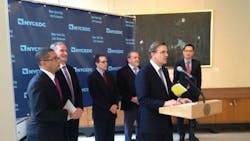NY Teams Up with GE Ventures, Eli Lilly, Celgene to Create Biotech Startup Fund
To further bolster its efforts to position New York as the “preeminent capital for life sciences innovation in the world,” the New York Economic Development Corp. announced on Wednesday the formation of the City of New York Early-Stage Life Sciences Funding Initiative.
With the city putting in $50 million, it will partner with Celgene Corp., GE Ventures and Eli Lilly & Co.
By leveraging the initial capital with matching funds from venture capital partners, the co-investment partnership will deploy a minimum of $100 million and seek to launch 15 to 20 breakthrough ventures by 2020.
Celgene, GE Ventures, and Lilly will receive early visibility on ventures.
The city is conducting a selection process to identify the anchor venture capital partners who will be selected based on a number of factors relating to the firms’ ability to build a generation of new companies around cutting-edge science, recruit industrial R&D talent and deploy sufficient follow-on capital over the long-term.
The Initiative was undertaken after dialog with local universities, entrepreneurs, CEOs, civic leaders and venture capitalists over the last several years. These stakeholders cited a deficit of senior entrepreneurial talent as a major barrier to success in building a robust commercial life sciences ecosystem, the economic department said.
Also on Wednesday city officials announced the creation of the Mount Sinai Institute of Technology (MSIT), which will establish a new institution designed to transform biomedicine through discovery and development of technology-based solutions to critical unmet healthcare needs.
MSIT will on engage in academic research, product development and active entrepreneurship in areas including Big Data, cloud computing, social networking, scientific and clinical simulation, tissue engineering, sensors, microprocessors, robotics, mechatronics, drug delivery and nanomedicine and other areas, ultimately conferring graduate degrees in Design, Technology, and Entrepreneurship (Ph.D.) and Biomedical Informatics (M.S.).
All of this activity adds further strength to the city which is the recipient of $1.4 billion in annual National Institutes of Health funding.
